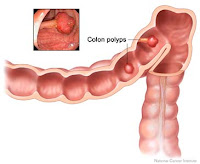What You SHould Know About Colon Polyps

What they are: Extra pieces of tissue that grow in your colon. Some polyps may be precancerous, others are benign.
Why they're not necessarily serious: It may sound strange, but getting a polyp can actually be good in terms of cancer prevention, says Patricia Raymond, a gastroenterologist in Chesapeake, Virginia. "In 90% of cases, we can stop the cancer before it starts. If the polyp is cancerous and hasn't spread, we can remove it and prevent the cancer." Of course, not all polyps are cause of concern, but you should have them removed so that a doctor can screen them for malignancy. If you do have polyps removed, get a follow up colonoscopy within 3 to 5 years to make sure they haven't returned.
When to worry: Early detection is key, because it's important to remove cancerous polyps before they spread. (The good news is that it typically takes 10 years for the cancer to invade the colon wall.) See your doctor if you experience symptoms, including blood in your stool, and constipation or diarrhea that lasts more than a week. The American Cancer Society recommends that everyone age 50 and older get an annual fecal occult blood test (a non-invasive test to screen for blood in the stool), or a flexible sigmoidoscopy (in which a flexible tube is inserted into the rectum to look for polyps) every 5 years, plus a colonoscopy every 10 years. However, if you are at high risk for colon cancer, consult your physician for screening guidelines.
Comments